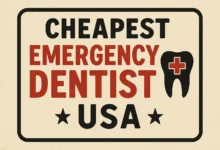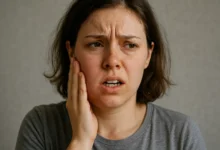Emergency Dentist No Insurance: Affordable Solutions for Urgent Care
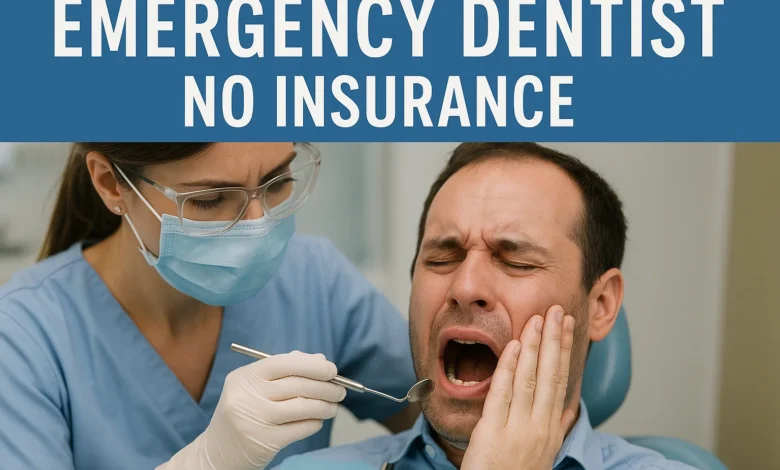
Emergency Dentist No Insurance: Your Complete Guide to Affordable Care in a Crisis
Did you know that the National Association of Dental Plans reported that more than 74 million of Americans were without dental cover in 2023? And when the dental crisis hits, whether it is intense pain in the tooth, a chipped tooth, or an abscess, one frightening question is added to the panic: “How can I afford an emergency dentist with no insurance?” The fact is that a dental crisis occurs when one is not at a good time, and without insurance, people are afraid to speak of the cost which is astronomical.
A full-fledged resource, created in cooperation with dental directors in federally qualified health centers and patient advocates, is able to show you right where to locate emergency dentist no insurance choices that will not leave you bankrupt. We will give you short term solutions to pain relief now and then, explain realistic pricing, and refer you to places you may be unaware of. Your smile should not turn into a nightmare in terms of cost.
What Qualifies as a Dental Emergency? First Steps
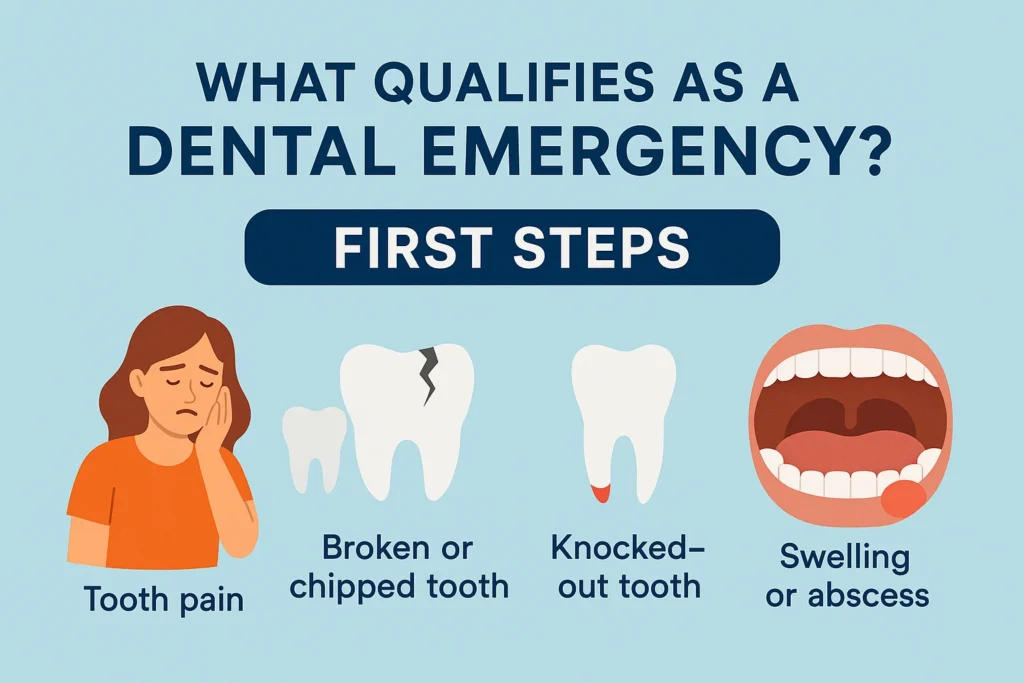
Before exploring options, it’s crucial to determine if your situation requires immediate care. Understanding this can save you unnecessary emergency fees for issues that can wait.
True Dental Emergencies (Seek Care Within 24 Hours)
- Blood in the mouth out of control.
- Crushing pain that cannot be treated with over-the-counter drugs.
- diffusing or becoming involved breathing/swallowing Facial swelling.
- Knocked out tooth (time is of essence to save the tooth)
- Face, jaw, or tooth injury which is traumatic.
- Pus drainage and fever Pus abscess or infection.
Urgent But Not Emergency Issues (Seek Care Within 2-3 Days)
- Lost filling or crown
- Broken tooth without severe pain
- Moderate toothache
- Food or object lodged between teeth
- Denture repair for essential daily function
Critical Warning: “Facial swelling that is spreading toward your eye or neck, especially when accompanied by fever and difficulty breathing, can indicate a life-threatening infection called Ludwig’s Angina. This requires immediate treatment at a hospital emergency room, not a dental office.” – Dr. Rebecca Morrison, Emergency Dentist
Immediate Strategies: What to Do While You Find Care
If you’re in pain and searching for an “emergency dentist no insurance near me,” these immediate steps can provide temporary relief and prevent further damage.
At-Home Pain Management (Temporary Solutions Only)
- OTC Pain Relievers: Substitute ibuprofen and acetaminophen as per instructions (when both are medically suitable on your behalf)
- Cold Compress: Place on the exterior of your cheek in intervals of 15 minutes to relieve the swelling and numb pain.
- Salt Water Rinse: Add 1/2 teaspoon of salt to 8 oz of warm water and swish gently so that bacteria are reduced causing the irritation to be soothed.
- Clove Oil: Use on a cotton ball and place against the sore tooth and leave there to soothe the pain.
- Dental Wax: Coat the sharp points of broken teeth or braces in order to avoid the soft tissue damage.
What to Avoid
- Aspirin placed directly on gums (can cause chemical burns)
- Heat applications (can increase swelling and spread infection)
- Using sharp instruments to try to remove debris or probe teeth
- Ignoring signs of infection (fever, swelling, pus) – these won’t resolve without treatment
Finding Affordable Emergency Dental Care Without Insurance
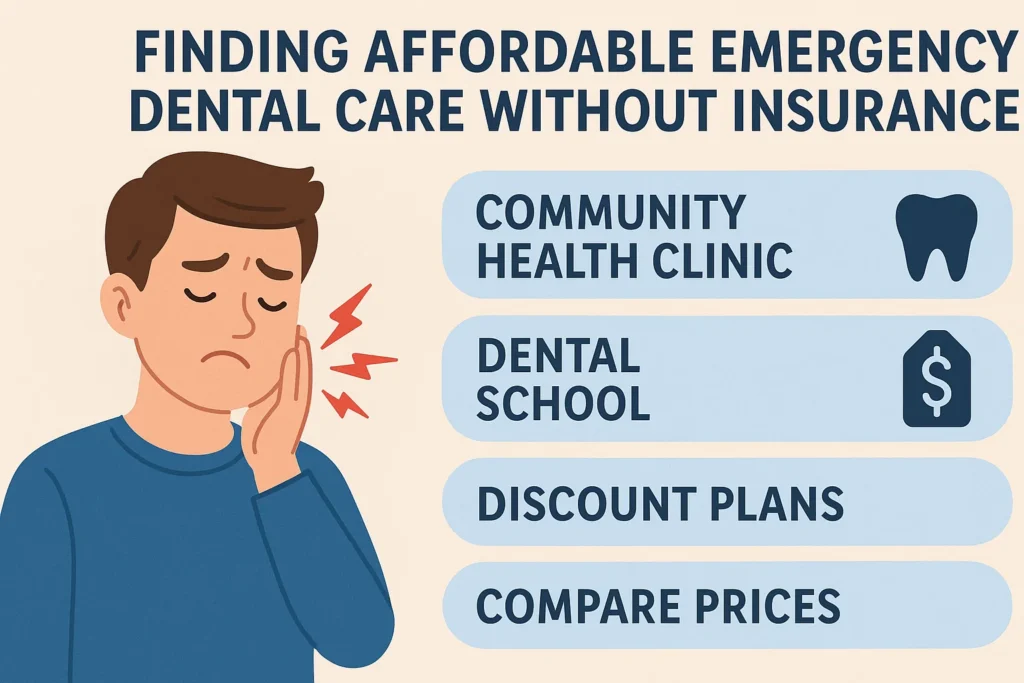
When you need an emergency dentist without insurance, these proven options offer varying levels of affordability and accessibility.
Federally Qualified Health Centers (FQHCs)
These community-based centers provide comprehensive healthcare on a sliding fee scale based on your income. They are required to provide dental services either on-site or through referrals.
- Cost: Typically 20-50% of private practice fees
- How to Find: Use the HRSA Find a Health Center tool online
- Best For: Low-income individuals and families who qualify for sliding scale
Dental Schools
Accredited dental schools provide care by supervised students at significantly reduced rates. Emergency clinics are often available.
- Cost: Generally 30-60% less than private practices
- How to Find: Search for “dental school clinic [your city]” or check the American Dental Association’s list of dental schools
- Best For: Non-time-sensitive emergencies (appointments may take longer)
Charity and Free Clinics
Various organizations host periodic free dental clinics or provide vouchers for care at participating practices.
- Cost: Free or very low cost
- How to Find: United Way (dial 211), Mission of Mercy, Dental Lifeline Network
- Best For: Those with extremely limited resources who can wait for clinic dates
Understanding Emergency Dental Costs Without Insurance
Facing an emergency dental no insurance situation is less frightening when you know what to expect financially. Here’s a breakdown of common emergency procedure costs without insurance.
| Emergency Procedure | Average Cost Range (No Insurance) | Notes |
|---|---|---|
| Emergency Exam & X-rays | $100 – $250 | Required for diagnosis before treatment |
| Tooth Extraction (simple) | $150 – $400 | Most common emergency solution for severe issues |
| Tooth Extraction (surgical) | $250 – $800 | Required for impacted or broken teeth |
| Root Canal (anterior tooth) | $700 – $1,200 | Tooth-saving but more expensive option |
| Root Canal (molar) | $900 – $1,800 | More complex due to multiple roots |
| Abscess Drainage | $200 – $600 | Critical for treating infection |
| Temporary Filling | $100 – $300 | Interim solution until permanent repair |
| Antibiotics/Pain Medication | $20 – $100 | Additional cost beyond procedures |
Payment Options and Negotiation Strategies
When you need an emergency dentist no insurance accepting payment plans, these strategies can make care accessible.
Direct Negotiation Techniques
Many dental practices are willing to work with uninsured patients if approached correctly:
- Ask About Cash Discounts: Many offices offer 5-15% discounts for patients paying cash upfront
- Request a Fee Reduction: Explain your situation honestly and ask if they can reduce the fee
- Prioritize Treatment: Ask what is absolutely necessary now versus what can be addressed later
- Get a Written Estimate: Request a detailed treatment plan with costs before consenting
Formal Payment Solutions
- In-House Payment Plans: Some practices offer structured payment plans without credit checks
- Medical Credit Cards: CareCredit and similar cards offer promotional no-interest periods for healthcare expenses
- Third-Party Financing: Companies like LendingClub Patient Solutions offer medical loans
- Dental Savings Plans: Not insurance, but discount plans that can be purchased and used immediately for 10-60% savings
5-Step Action Plan for Your Dental Emergency Right Now
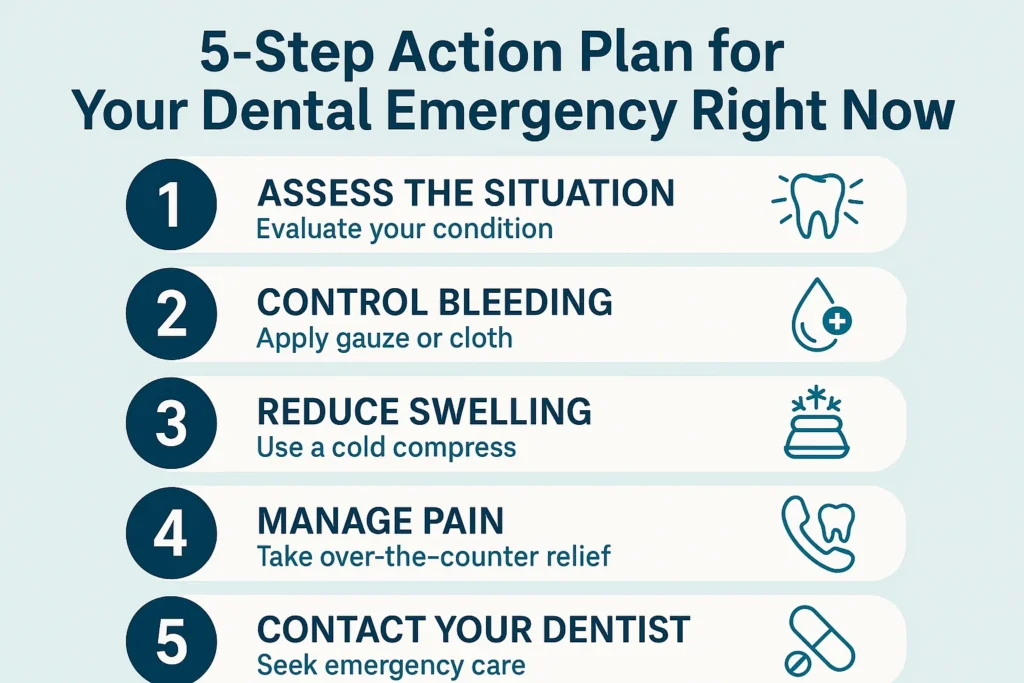
- Evaluate the Emergency Level: Find out whether you require urgent treatment (visit Emergency Room due to life-threatening swelling or trauma) or can wait until visiting the dental office.
Make multiple calls to different clinics: Call 3-5 types of providers (FQHCs, dental schools, private practices) - Ask particular questions: What would be your fee to have an emergency examination of uninsured patients? Do you offer payment plans?”
- Get Your Information Ready: Be ready with information like how long you have been having your pain, what you have tried to treat your pain and what your symptoms are. Be aware of monthly budget on possible payments.
- Ask About Prioritized Treatment: Only ask what is necessary to solve the acute emergency with the intention of solving the other problems subsequently.
- Investigate all Financial Opportunities: Find out about cash discounts, sliding scales, payment plan, and dental savings plan as part of your pre-call research.
Frequently Asked Questions (FAQ)
Emergency rooms in hospitals are capable of treating only life-threatening cases such as uncontrolled bleeding, serious infections that have diffused, or trauma resulting in the fracture of facial bones. They will not carry out dental procedures such as extractions and root canal. They can prescribe pain medication and antibiotics and pass you on to a dentist to be treated.
Authentic 24-hour dental practices are highly rare and normally very costly. Hospital emergency rooms are the best choices you should have in case of critical matters or urgent care centers in case of pain management until the dental offices open. There are dental practices in some large cities, which have long hours or open during the weekends.
The cheapest extraction is usually at Federally Qualified Health Centers (FQHCs) with sliding scale charges depending on the income or even dental schools where students have procedures done under supervision at lower charges. Basic extractions will typically cost $150-400 out of pocket without insurance; whereas it will be $75-200 with insurance.
Dentists have the right to refuse any non-emergency treatment because of any reason, such as insurance or inability to cover. But to true emergencies, where the pain or risk of infection is severe, ethics would still have dentists offer at least palliative care (relief of pain and control of infection) without regard to the payment capacity.
Those who do not have money may have free dental clinics (they can be found by searching using the United Way 211 service), free dental services through charitable organizations such as the Mission of Mercy events, dental school clinics at the lowest sliding scale rate, or emergency dental grant programs offered by such organizations as the Dental Lifeline Network. In some health departments, there are the provision of emergency dental services which are limited due to extreme need.
Conclusion: Taking Control of Your Dental Emergency
It is easy to feel flustered when you are in an emergency and have no insurance, but as you have learned, there is a wide range of solutions in the gap between silent misery and bankruptcy. The trick is to know where to find it – sliding scale dental schools and clinics, negotiation, and payment plans.
It is important to remember that in case of dental emergencies, prompt pain treatment is only one aspect of the problem, as it helps to avoid further complications of the health condition and more costly treatment in the future. Your wellness is something to fight about and that is why most dental professionals decided to join the profession with the sole aim of assisting people like yourself. By using the strategies outlined in this guide, you can navigate your emergency dentist no insurance situation with confidence and find the affordable care you need.
Need immediate assistance finding care? We have a current list of cheap dental practitioners in every state of the 50 states. Browse our list of affordable dental providers of emergency services in your neighborhood now. To learn more about dental expenses, visit our entire dental insurance options guide.
The Best Water Flosser Braces 2025: Top Options for Braces Wearers
